From ancient
times, tempo doeloe, the Dutch Indies years of the Cassuto's 1915
- 1925
|
The
zionist congress
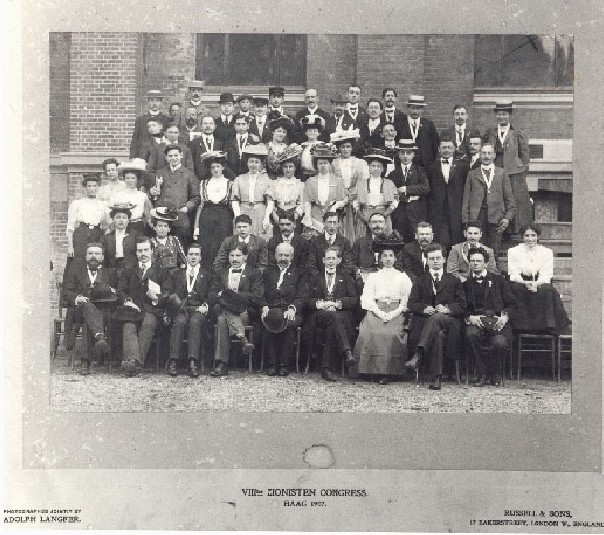
a rare photograph,
I don'know how it came in my possesion! It is a picture of the participants
in the seventh Zionist congress in The Hague, 1907. Two of the participants
met each other there - is my hypothesis - and married some years later,
in 1912: Isaac Cassuto and Caroline Winkel. Search fot them - a difficult
task - and if you can't find them, you can't miss them here

|
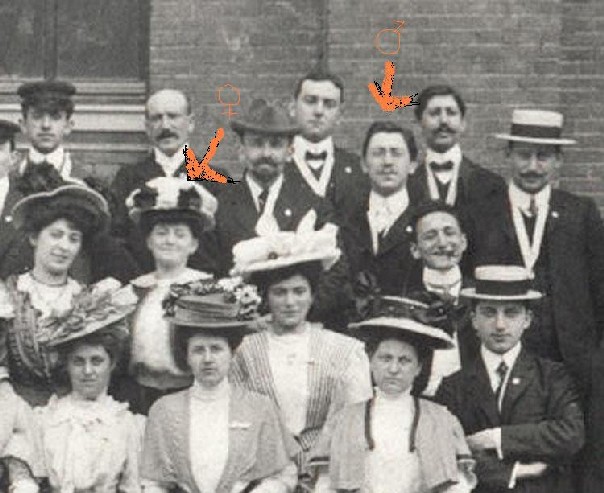

|
|
Pekalongan, 1915-
1917
Some 3 years
Ies worked as a lawyer in The Hague; perhaps because he was not too succesful,
(the first world war contributing to a situation not favorable for starting
entrepreneurs), perhaps because of the prospect, that in the colonies
Jewish origin played a minor role, Ies and Lien left for the main Dutch
colony of the East Indies, nowadays Indonesia.
reconstructed timetable residence of Ies and Lien in the Dutch Indies:
1915-1917: Pekalongan, middle part of Java
1917-1922: Probolinggo, east part of Java
1922: leave in Holland
1922-1925: Serang, west part of Java
1925-1927: Bandung, west part of Java
1927-1929: Magelang, east part of Java
1929-1930: leave in Holland
1930-1934: Bandung
They arrived there on the Dutch East Indies in the first half of 1915.
Lien was pregnant of her eldest son Max.
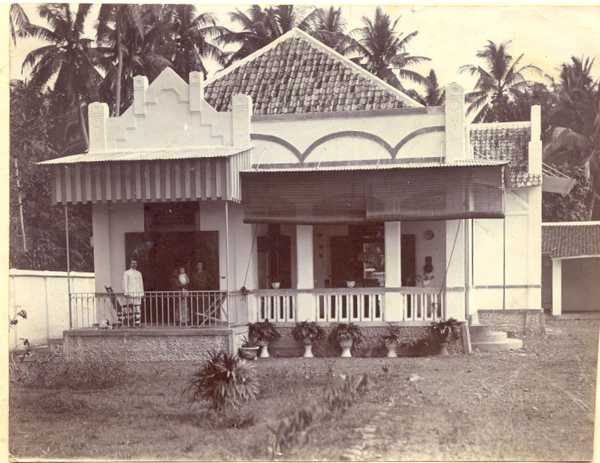
first house
of Ies and Lien Cassuto in Indonesia, Pekalongan, on the isle of Java,
in the middle part situated at rhe Java sea. The first months, more
then 10, they lived in a hotel, then moved in this house ("op Bermi"),
but they moved to another house in December 1916, "because at Bermi
they often stole", as Lien wrote in the baby book dedicated to
first born baby Max. 
|
|
1915, from the babybook:
a crisis with baby Max Cassuto
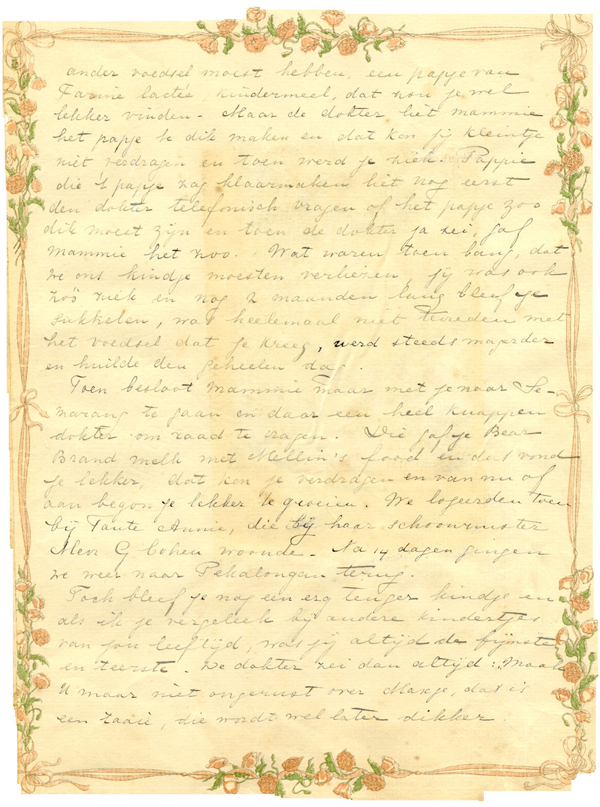
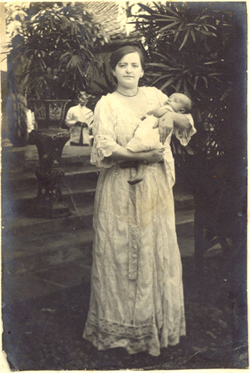 after
the birth of Max Cassuto in 1915, Pekalongan, on the isle of Java, his
mother Lien Cassuto-Winkel kept a baby book; on page 2 - see above -
she describes the food crsis with the two after
the birth of Max Cassuto in 1915, Pekalongan, on the isle of Java, his
mother Lien Cassuto-Winkel kept a baby book; on page 2 - see above -
she describes the food crsis with the two 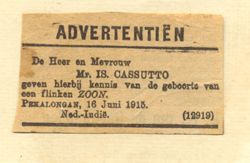 month
old baby Max; he didn't accept the food from mother and the porridge
prescribed by the doctor and mother travels with the baby to the big
City Semarang to consult a specialist. She stayed with her sister Annie
who apparently too lived in Indonesia with het sister in law mrs. G.
Cohen in the town of Semarang. month
old baby Max; he didn't accept the food from mother and the porridge
prescribed by the doctor and mother travels with the baby to the big
City Semarang to consult a specialist. She stayed with her sister Annie
who apparently too lived in Indonesia with het sister in law mrs. G.
Cohen in the town of Semarang.
In the baby book story Mother Lien adresses herself as it were personally
to Max. What strikes in this babybook is the many ailments and troubles
Max went through in his first 2 years:
first he got "apepokken" (Monkey pox?).
He refused to drink and eat.
Then Lien fell seriously ill and had to be nursed in a clinic in Semarang,
Max was half a year and had to be taken care of by a friend of Lien
for several weeks.
Just after his second birthday he got "terrible pustules",
which lasted for 3 months.
After that an automobile bumped at the cart he drove in with mother
Lien, which caused some head injuries, though not serious; little Max
reorted to everyone in Maly language: 'auto kena glinding"

|
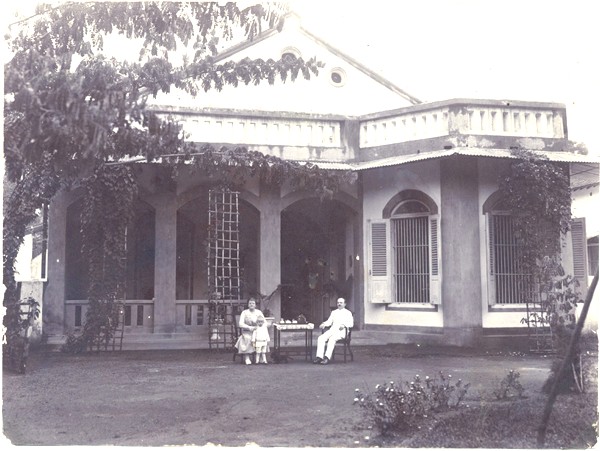
This must have been the second house in Pekalongan or the one in Probollinggo

|
|
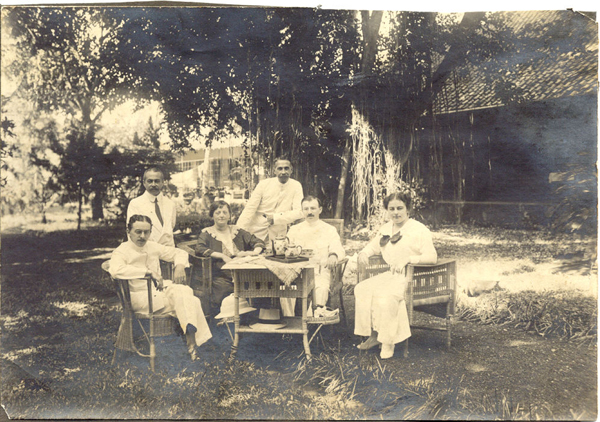
Ies and Lien
(center) with friends in Pekalongan; Lien reports in March 1917 her sister
Annie with her daughter Lydia and son Andree came to stay with them for
some time (I don't know the reason, perhaps her marriage went not too
well, later she divorced and married Jo Polak; about Andree and Lida later
more)
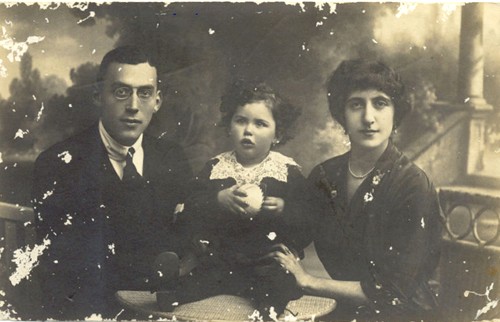 This
is Annie with her first husband Cohen and daughter Lydia, picture I
estimate to have been taken in 1916. This
is Annie with her first husband Cohen and daughter Lydia, picture I
estimate to have been taken in 1916.
In 1917 she visited Indonesia with Lydia and her baby son Dé
and stayed for some time with her sister Lien in Pekalongan.

|
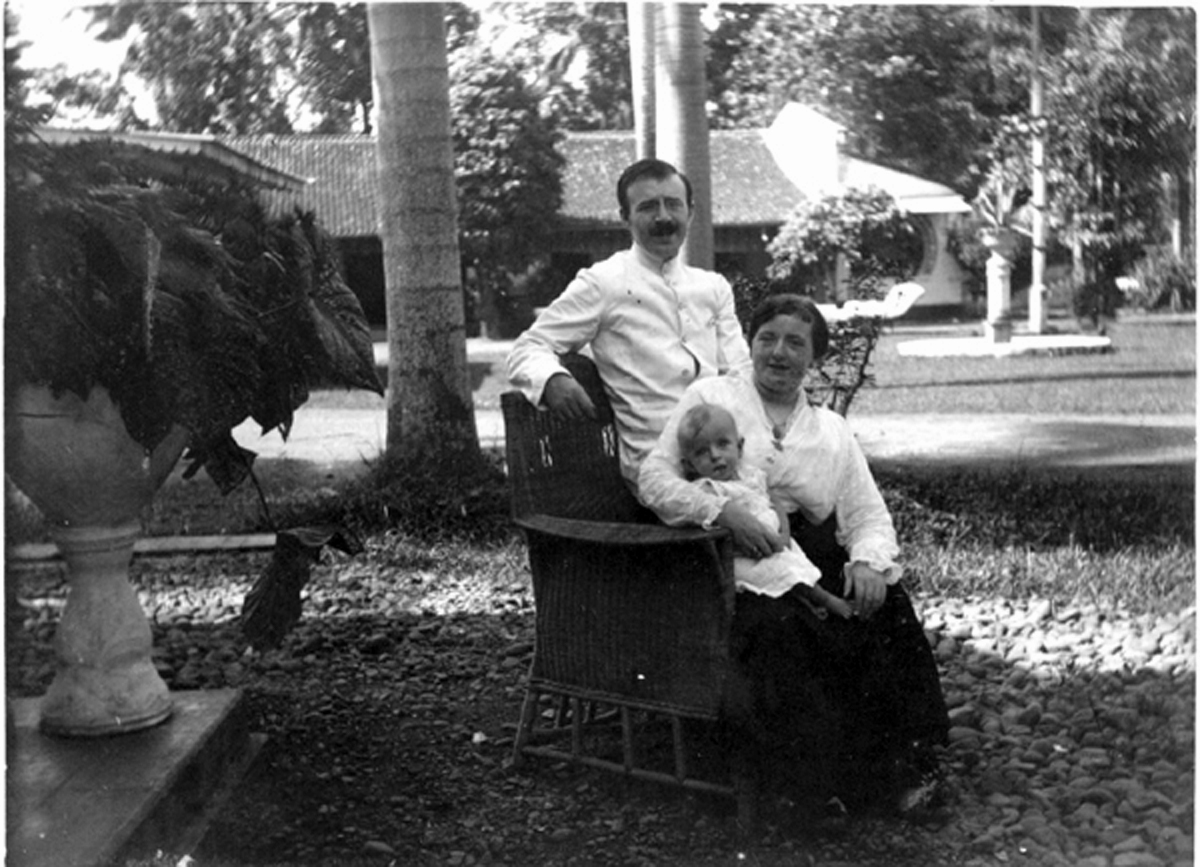
Ies, Lien
and Max in Pekalongan  |
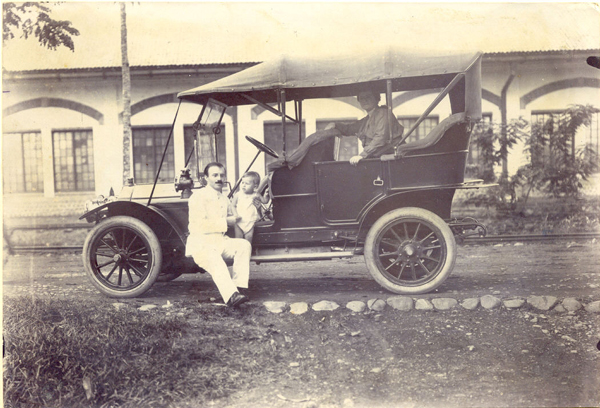
Ies with Max
and Lien in the car, most probably their first one  |
|
Probolinggo, 1917-1922
In November
1917 Ies was transferred to Probolinggo, in the east of Java. I suppose
he was already, as later he was, employed in education. Shortly after
moving to this new place Ernest was born.
In the babybook less then half a page is dedicated to Ernest. She writes:
"all alone you came in the world, no doctor ot nurse attending. You
were such cute and sweet baby, always good and never a bother. You could
tolerate Mommy's nourishment very well and you grew firmly. All was so
different compared with Max with whom we had so much worries"
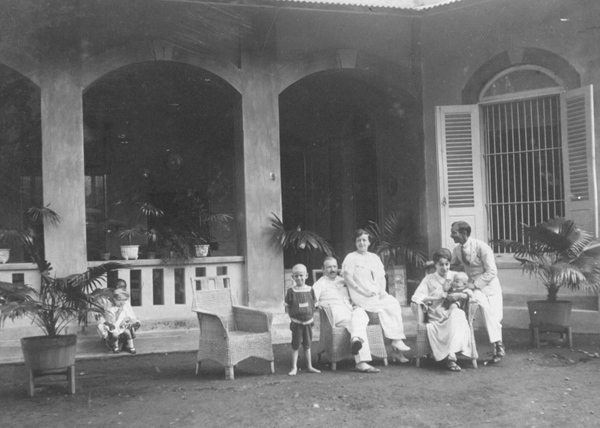
Probolinggo,
Cassuto's with friends; I guess the about 5 year old boy is Max, flanked
by his parents. Possibly the toddler at the left is Ernest, on the lap
of his Indonesian nurse, called 'babu'. The role of these nurses in child
life at the time cannot be underestimated. The child spent more time with
his or her babu then with his or her mother.
Lien writes about Max: "In Probolinggo Mommy had to look for a new
babu and there babu Mah entered the family. What a good old maid she was
and how she loved njo (short for 'sinjo', young gentleman, originated
from Portuguese senhor) Max."
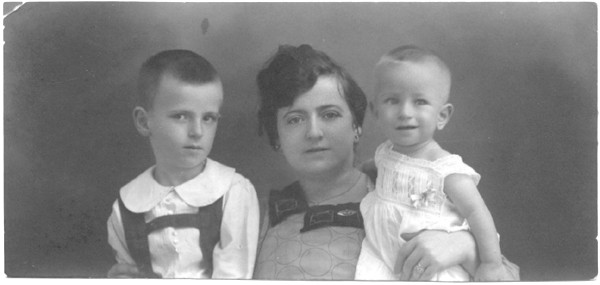
Lien with left Max and right Ernest. Considering the age of the boys
this picture must date from Probolinggo
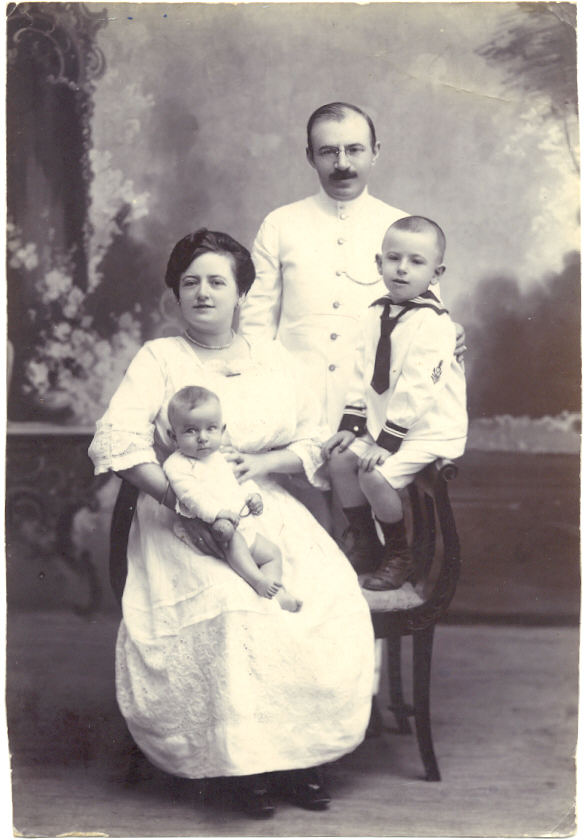
"official"
picture (above) of the family, about the same period
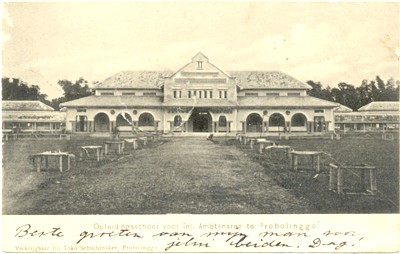 Most
of the time Ies Cassuto was teacher and later director of schools for
the education of indonesian civil servants. This is a picture of the school
in Probolinggo. Most
of the time Ies Cassuto was teacher and later director of schools for
the education of indonesian civil servants. This is a picture of the school
in Probolinggo.
Below Ies in full glory amidst his students.
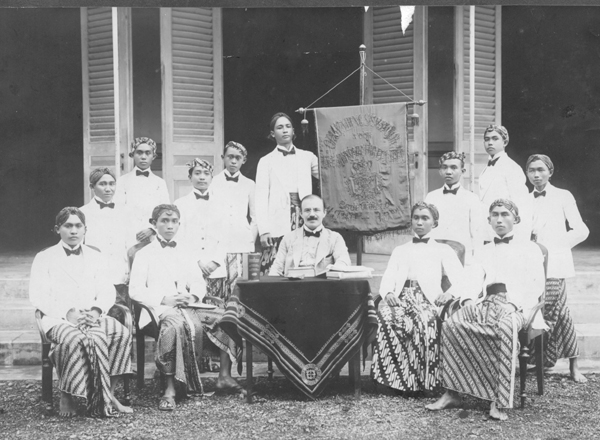
In 1922 the family Cassuto went for half a year leave to Holland.
Below we see Lien, Ernest, Max and friend at the North Sea beach, probably
at Scheveningen;
They sit in those typical beach chairs you could rent, I, Rob, remember
the too from my childhood
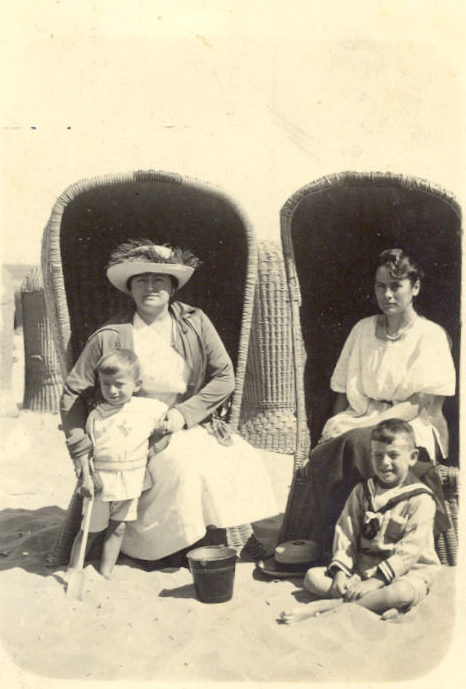
I guess this picture below is also taken during the Holland leave, considering
the date of 1922 and the 'artistic'style. It is one of the most beautifull
pictures of Lien to my opinion.
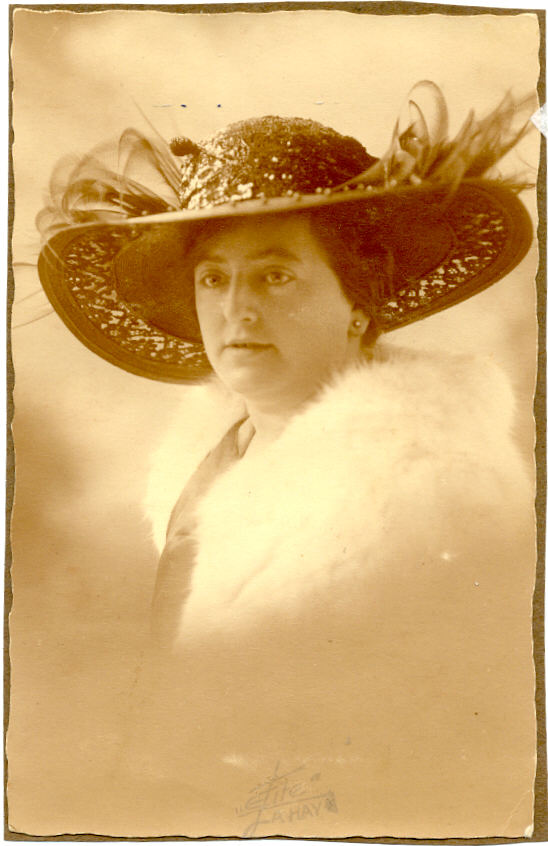
Back in Indonesia
Ies had been stationed in Serang, in the West of Java. 
|
Serang
1922-1925
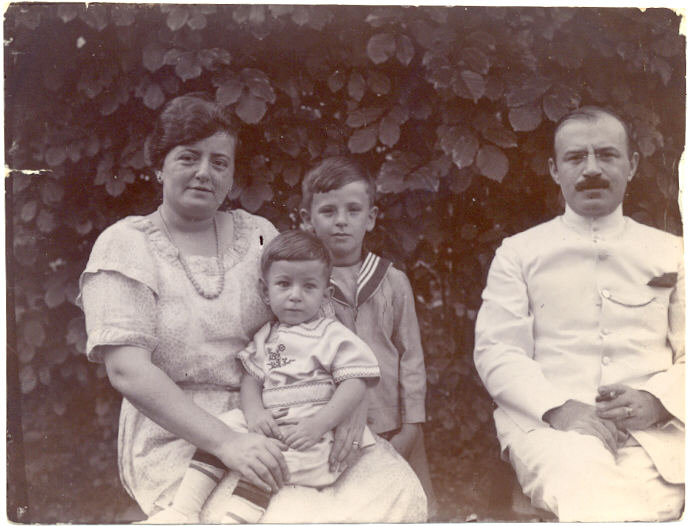
Isaak Cassuto
and Carolien Winkel, my grandparents, and their sons Ernest (on mothers
lap, "Erry")
and Max, anno 1922; photo taken in Serang, in the west of the isle of Java,
where Isaac was stationed for a short while, a suppose one or two years.
to
the years 1925-1934
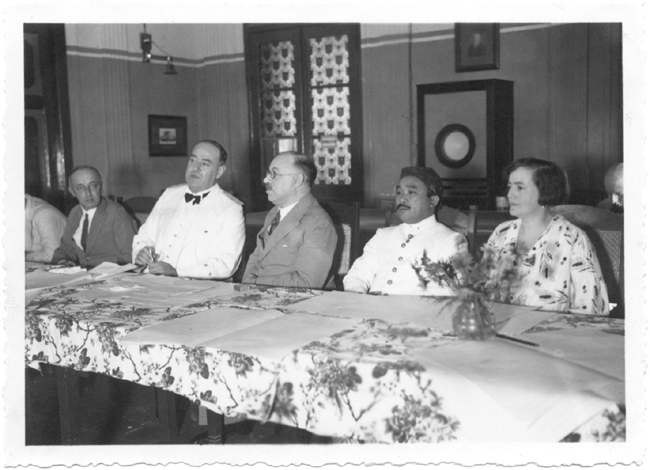

|










 after
the birth of Max Cassuto in 1915, Pekalongan, on the isle of Java, his
mother Lien Cassuto-Winkel kept a baby book; on page 2 - see above -
she describes the food crsis with the two
after
the birth of Max Cassuto in 1915, Pekalongan, on the isle of Java, his
mother Lien Cassuto-Winkel kept a baby book; on page 2 - see above -
she describes the food crsis with the two  month
old baby Max; he didn't accept the food from mother and the porridge
prescribed by the doctor and mother travels with the baby to the big
City Semarang to consult a specialist. She stayed with her sister Annie
who apparently too lived in Indonesia with het sister in law mrs. G.
Cohen in the town of Semarang.
month
old baby Max; he didn't accept the food from mother and the porridge
prescribed by the doctor and mother travels with the baby to the big
City Semarang to consult a specialist. She stayed with her sister Annie
who apparently too lived in Indonesia with het sister in law mrs. G.
Cohen in the town of Semarang.
 This
is Annie with her first husband Cohen and daughter Lydia, picture I
estimate to have been taken in 1916.
This
is Annie with her first husband Cohen and daughter Lydia, picture I
estimate to have been taken in 1916.


 Most
of the time Ies Cassuto was teacher and later director of schools for
the education of indonesian civil servants. This is a picture of the school
in Probolinggo.
Most
of the time Ies Cassuto was teacher and later director of schools for
the education of indonesian civil servants. This is a picture of the school
in Probolinggo.

